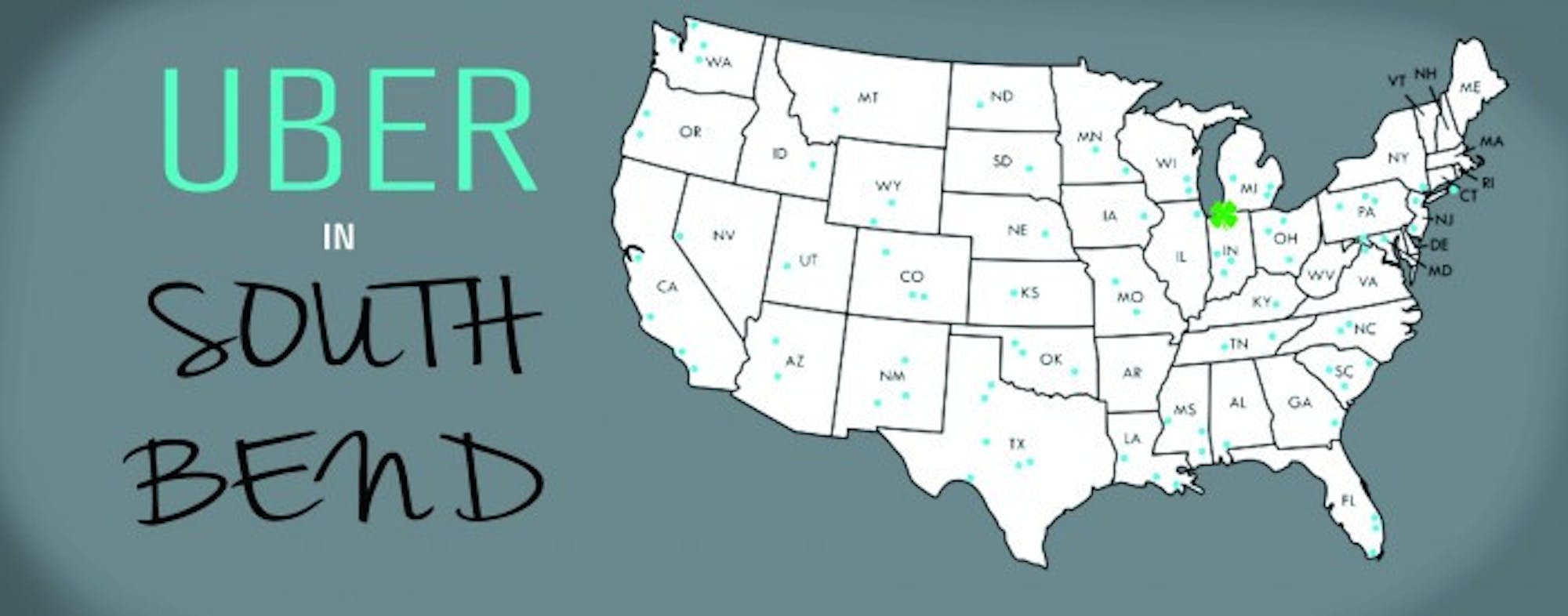Since its founding in 2009, Uber has spread to more than 100 cities – and since it added South Bend to that list a week ago, it has already won the support of many students who see it as a streamlined way to find a ride.
The term “sharing economy” is tossed around to describe this untraditional system, and Kristen Collett-Schmitt, associate teaching professor in the Finance department, said the concept appears to have evolved in the last 10 to 15 years alongside emerging new technologies that allow people to collaborate and allocate scarce resources. The rising popularity of Uber and other similar businesses such as Airbnb reflects a cultural shift in the past decade, she said.
“Social networking has increased the willingness of individuals to actually share with each other, encouraging this type of economy,” Collett-Schmitt said. “One might argue that the ‘sharing economy’ is not just a function of changing technology, but also the financial crisis of 2008 and the uncertainty that still exists regarding the stability of the economy.
“Economic uncertainty reminds us that resources are scarce, and increasingly-present environmental concerns encourage us to use resources more wisely. I think the ‘sharing economy’ supports this idea completely.”
Junior Rachel Broghammer took advantage of an Uber promotion offering free rides during Labor Day weekend. As a native of San Francisco, where Uber started, she had used it in the past and said she was “really kind of shocked” to hear it would come to South Bend.
“It’s really, really popular in San Francisco, partly because taxis there are so pricey,” she said. “And you don’t have to wait as long if you can find a driver that’s closer to me.”
Her first South Bend experience with Uber went well, she said, but she expects it will improve as it becomes more widely-used – some students were unable to get rides because no local drivers were available at certain times.
“Our driver came right up in the car we expected, and he was really incredibly nice, a South Bend resident who said he does this on his days off,” Broghammer said. “Everything was really nice and clean; they really research their drivers.”
She said she’s comfortable with Uber because of the comprehensive review system available, where riders can give feedback about particular drivers that’s available for other riders to view. As it takes off in South Bend, though, it will likely take time before there are enough reviews to be helpful, she said.
“With the reviews, you know ahead of time what you’re getting,” she said. “You don’t necessarily know that about a taxi. … For me, I think I would be very comfortable with using it anytime if I’d looked at the reviews of the driver.”
For Broghammer, there are still situations in which she’d still stick to a traditional cab instead, though.
“The only time I would prefer a traditional cab would be going from something off campus late at night, because at least then you can pack a lot of people into the cab,” she said. “And even if I don’t know the driver, I can trust the cab company.”
Senior Quinn O’Heeney used the free ride promotion last week with a group of seven people and said it went well. The driver arrived at library circle when he said he would and was polite and funny, O’Heeney said. He said regular cabs would be more affordable in some situations, but the Uber payment system is more appealing overall. “I would rather use a flag drop cab if it was just me or maybe one other person since $3 each would probably be less expensive,” he said. “In any other situation, I would prefer Uber because of the cashless aspect of it. I have been in many cab rides where one person pays way too much because people don’t have small bills and the driver doesn’t have correct change."
There are limitations to Uber’s availability — South Bend International Airport officials issued a statement Aug. 28 to inform travelers that Uber drivers would not be allowed to pick up passengers at the airport, according to a report in the South Bend Tribune.
The “sharing economy” has run into legal issues in some cities, especially with regard to licensing and taxing, and Collett-Schmitt said this is because laws are not yet written to handle this new type of consumption.
“I believe these concerns are legitimate,” she said. “The goods in this type of economy might also not be subject to the same laws that protect consumers. With car-sharing services, it’s not always clear who would be liable in the case of an accident. “Taxis bring up the larger issues involving regulation. Many large cities require drivers of taxis to purchase ‘medallions’ or licenses, which are very expensive. . . . This regulation might also stabilize prices and require drivers to meet certain quality standards, thus protecting consumers.”
Collett-Schmitt said she sees services like Uber as solving market failure by generating transactions that would not otherwise take place if new technology had not lowered transaction costs. In this way, the additional transactions benefit society, she said.
“Services like Uber will also create competition for taxi drivers who had not previously been innovative because of the lack of competition,” she said. “One hopes this will encourage producers that offer substitute or complementary goods to be more innovative.
“Or, as the ‘sharing economy’ becomes more popular, larger, more well-known companies that already offer complementary or substitute goods may invest in goods that are part of the ‘sharing economy,’ like a car manufacturer teaming up with Uber.”













